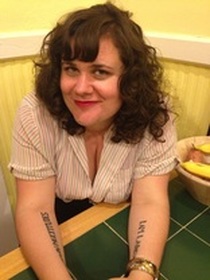 "Young Playwright For Life" by Manna-Symone Middlebrooks GENNE MURPHY was confident that she would become a professional writer even as a student at Central High School. However, what she hadn’t discovered yet was her voice as a playwright. Her first play, A Perfect Mother, was a winner in the 1999 Philadelphia Young Playwrights Festival. Outside of the work she’d done in class with teaching artist Ed Shockley, this was Genne’s first experience with theatre. She fell in love with the collaborative nature of theatre and the multiple ways in which it communicates with audiences and other artists. That love for collaborative art aided her decision to study playwriting and theatre in college, at NYU's Tisch School of the Arts. In 2005, after college, Genne came back to Philadelphia and worked her way up from Office Manager to General Program Manager at Young Playwrights. During her time on staff, Genne learned about the function of a nonprofit arts organization and how to facilitate the learning and discussions centered around student voices that are at the core of PYP. In this time, her relationship with Glen Knapp developed and he became her mentor; that lead to Genne briefly serving as a guest Executive Director in 2014. Since then Genne has continued to establish herself as an artist and nonprofit arts professional. She has not only been accepted into Yale University’s M.F.A. playwriting program, but her play Giantess was selected as one of the pieces in the 2015 PlayPenn Conference. This highly selective conference invites only six playwrights each year to develop a piece through an in-depth series of workshops with a local director, dramaturge, designers, and actors. After the excitement of seeing the reading of Giantess, the PYPAC caught up with Genne to talk about the PlayPenn process and how much she has grown since beginning with PYP in 1999. Alumni Council: What sparked your interest in PlayPenn and why did you decide that Giantess was the play you wanted to workshop?
Genne Murphy: I had the idea [for GIANTESS] for a number of years, but hadn’t put anything down on paper until April 2014. I knew there were several big conferences I wanted to submit to... I was particularly interested in PlayPenn. For a whole month they provide you with intensive [revision] support; an artistic cast, director, dramaturge, opportunities to hear the work out loud in rehearsal and in front of an audience. I was especially excited because [the conference] is based in Philadelphia. There are a number of really amazing local artists here... [including] people I have worked with through PYP: teaching artists, directors and dramaturges. So I knew that it would be awesome if I landed there… And I did! AC: Where did the idea for Giantess come from? GM: Originally, the idea came in a dream: I was trying to pour water into a tiny glass and it was really annoying. Then all of a sudden I realized, “OMG I’m a giant!” I panicked, woke up. [The dream] really stuck with me--that idea of being so discombobulated and feeling extremely uncomfortable in your body. I thought there were a lot of interesting metaphors to explore. GIANTESS starts with a young woman who is taking care of her ailing, disabled grandmother. Early on in the play she discovers a girl her own age in the abandoned factory behind her grandmother’s house - a 30-foot tall giantess. They develop a deepening connection to one another in this very fraught and heightened situation… Finding a giantess behind your house, it’s potentially upsetting. At PlayPenn these were the questions I asked myself in revision: how do I make the piece work theatrically and dramatically? How do I make each scene "pop?" How do I make the relationships feel believable and real? How do I make moments that are really interesting and evocative on stage, both with language and visually? How am I addressing the themes? It helps when you have a great artistic team right there with you. They really bring their own new and complex thoughts to the process. AC: You’ve talked a lot about revision, and that skill is at the core of education program at Philadelphia Young Playwrights. What are some of the things that you have learned as a PYP student and staff member that are still apart of your revision process? GM: When I go through any big revision or production process I often think, “Thank god for Philadelphia Young Playwrights!” My experience, [as] a student, educator, and staff member enabled the idea of revision – the actual work of revision – to be a less scary prospect. Over the course of a year in a classroom, you see the journey that plays go through [as students rewrite]. That [transformation] only can happen by being open to that type of artistic process. It becomes so normalized that you realize revision is just what you do. You write a play, you have the opportunity to workshop scenes, get feedback from other people, and just see and feel it out loud. “Oh, here’s where I can make this tighter and clearer.” Or, “Oh, what would it be like if I wrote a scene with these characters?” PYP is so good at laying out the tools that you can use as a writer to get deeper into your work. … I think that allows playwrights to have a lot of agency, feel comfortable, and become more and more confident in that process. All of these things impacted me as an [emerging] writer. Now, I can go into a situation like PlayPenn and achieve so much in that artistic process… because I have this toolbox already handy that PYP taught me. AC: What keeps you involved and coming back to PYP? GM: I am lucky that as a young twenty-something-year-old, PYP was my first big career job. That helped me solidify that connection [to the organization] as a playwright and alum. When I left the staff full-time, I didn’t necessarily want to leave that relationship with PYP. The amount of energy I put in to this organization is personally rewarding. My time here has enabled me to become a better educator and a better nonprofit professional because of my deep connection to the program. I am just as interested in seeing what can be cultivated with other alums. Frankly, I have met so many great people, and amazing artists at PYP. To be able to have interesting conversations and connect with young artists, it just brings so much value into my life. I find it very invigorating and fulfilling. AC: Along the lines of mentorship and other relationships that you have developed here, Glen has been a very important person in your life. Can you talk a little bit about how that relationship developed and where it is now? GM: It has been wonderful to have someone who is as skilled, deeply committed and extremely energetic as Glen for a mentor. He’s just so smart about how to be a leader, and is able to juggle so many different balls at one time. He’s great at cultivating all different types of partnerships with arts organizations, theaters and universities. PYP has accomplished so many meaningful collaborations and networking possibilities. Those relationships have helped to broaden and strengthen our presence as an arts education organization in the region – and nationally. Just getting to see Glen in action is a great way to learn. Over time, he gathered faith in me as a young leader. He would give me projects to do, [encourage] me to jump in and do stuff. To learn that way is a great way to learn – you have someone who is a very accomplished, skilled leader to give you feedback and guidance. AC: You’ve talked a lot about how much you have grown as both an artist and administrator since you got involved with Philadelphia Young Playwrights in 1999. If you could give a nugget of advice to a student who is starting in PYP, one who is currently in the program, or an alum, what would each be? GM: For brand new writers: Be open! Before I wrote my first play, [in a creative writing class] in high school, my feeling was, “Why would I want to write a play?” I very much identified as a writer, but I wrote poems and short stories. I initially had no interest. I didn’t even know what it meant to write a play. Over the course of that year, getting to write scenes, learning from veteran teaching artists [Ed Shockley], and hearing my play aloud for the first time, it really shifted a lot for me. I still have moments where I remember some of [what] he said to us in class. So… you might be super excited, you might be a little ambivalent, or you might be unsure. It’s okay not to know what it’s going to be like; just be open to the experience. I found it to be a life changing experience to participate in PYP this way. It also had impacts beyond me just as a writer. PYP is a confidence builder; it helped me to become a better communicator. For playwrights who are already involved in Young Playwrights: be open to the opportunities that you are now being presented with at PYP. After I was out in the world as a playwright in college and beyond, I began to more fully appreciate what Young Playwrights does. They center the voice of the writer; they center your voice. I’ve had [experiences] in the theatre world where the playwright’s voice hasn’t actually been understood or respected. I had to figure out how to advocate for the play. You deserve to be a part of an artistic process where your voice is just as valued as all of the voices in the room. It helps to make better art. In my opinion, that is the ideal way to create theatre. Try to retain the excitement that you have from this process at PYP. For PYP alums: there are still a lot of opportunities to engage with Young Playwrights. Whether it’s through mentorship, dropping into specific opportunities that might arise around programming, or even just as an audience member. Staying engaged is a way to connect with other alums of different experiences and ages. If you are [already] involved with young playwrights as an alum, thank you. It’s appreciated. If you are considering it and haven’t yet made the move, it’s really worthwhile. * * * * * As our conversation ended, Genne immediately began to talk about the Alumni Council, possible initiatives, and ways we can pay forward the wonderful opportunities that PYP has afforded us. She has taken what she learned as a student in high school, applied it to her learning in college, used experience and knowledge to facilitate the programs at PYP, and continued to grow as an artist and person. Through her clear dedication, Genne has become a life-long member of the PYP family.
0 Comments
Leave a Reply. |
Categories
All
|
|
This work is licensed under a Creative Commons Attribution-NonCommercial-ShareAlike 2.0 Generic License.
|
|
© Philadelphia Young Playwrights - 1219 Vine Street, Floor 2 Philadelphia, PA 19107
Phone: 215-665-9226 Fax: 215-665-9228 Email: [email protected] |


